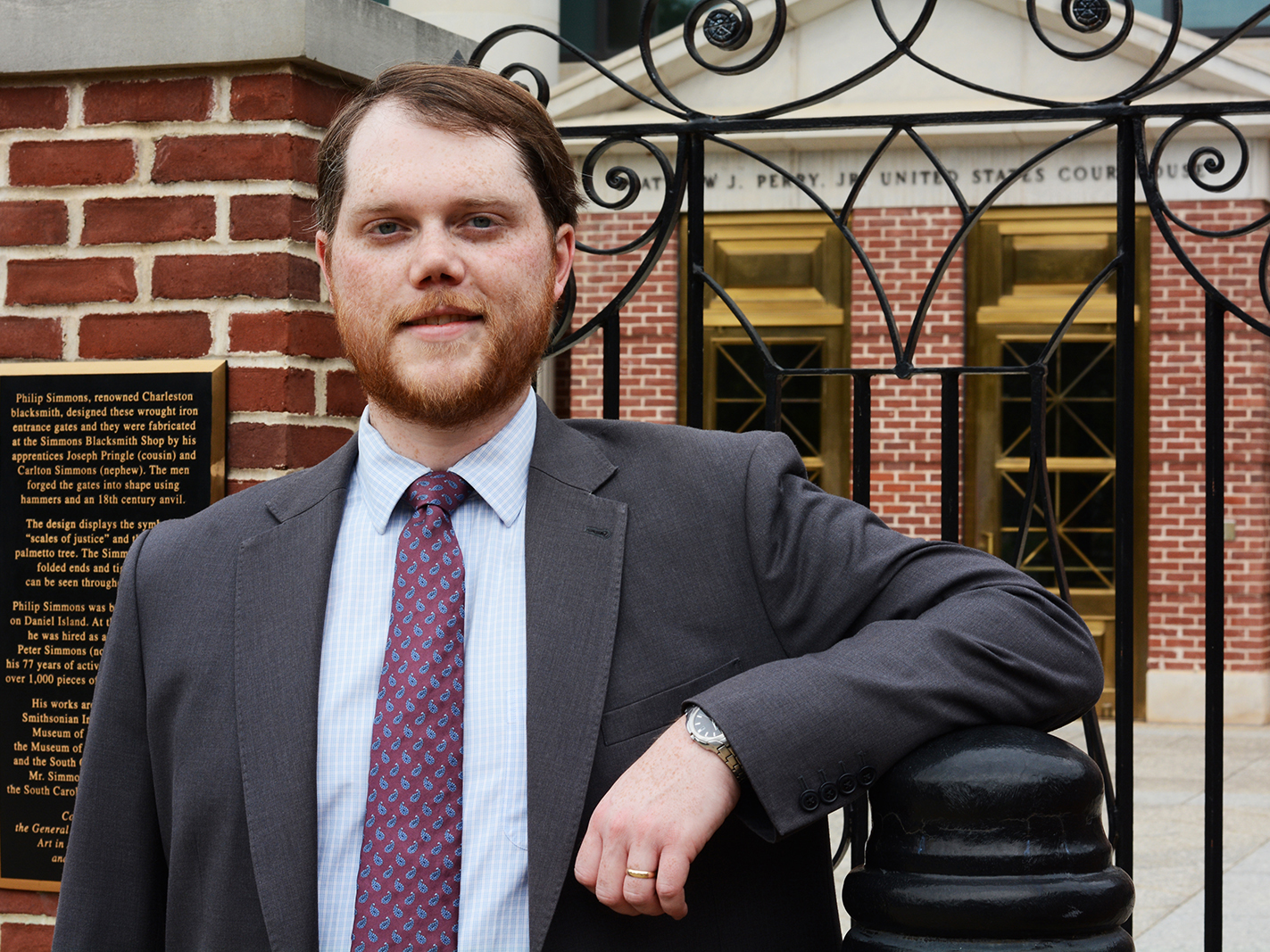John Warren L'13 is the first Elon Law alum to clerk for a U.S. Court of Appeals and his journey to the Fourth Circuit was anything but ordinary.
This article was first published in the Summer 2021 issue of the Elon Law News Bulletin.
***
The story of the first Elon Law alumnus to clerk for a U.S. Court of Appeals judge is one of perseverance and networking with a sprinkle of serendipity. Or, as John Warren L’13 will tell you, “Everything just fell into place.”
Warren is in the final weeks of a yearlong clerkship with Judge A. Marvin Quattlebaum, Jr. of the U.S. Court of Appeals for the Fourth Circuit out of South Carolina. Much of his work has been remote because of the COVID-19 pandemic – but that hasn’t made it any less fascinating.
He’s had his hand in researching and drafting opinions on a variety of complex legal issues: Criminal. Civil. Bankruptcy. Administrative. Immigration. Even election law.
“During law school, I knew that I wanted to clerk for a Fourth Circuit judge, and I hoped to find a clerkship immediately following graduation,” Warren said. “Even though I was unsuccessful at first, I never gave up, and the journey to achieve this clerkship has been the most rewarding experience of my life.”
Let’s rewind to 2013. Warren, a symposium editor for the Elon Law Review and two-time regional semifinalist in the ABA National Appellate Advocacy Competition, had been told the value of clerkships from mentors at the law firm where he worked while an undergraduate at the University of South Carolina.
As winter gave way to spring, Warren blanketed South Carolina with applications to federal and state appellate judges. “It was less about finding a good job after a clerkship than it was about developing relationships and skills,” he said. “I never had a desire to funnel into ‘Big Law.’”
Securing a position for two years with the Hon. John W. Kittredge of the Supreme Court of South Carolina whetted Warren’s appetite for a subsequent federal clerkship. When no offers materialized, Warren returned to the same Columbia firm where he worked prior to Elon Law.
Here’s where things get interesting.
In private practice, Warren often served as co-counsel in civil litigation with South Carolina attorney Donald Coggins Jr. In 2016, Coggins was nominated by President Barack Obama for a seat on the bench of the U.S. District Court. Though the nomination expired with the change of administrations, Coggins was unanimously confirmed after being renominated by President Donald Trump.
Coggins needed a clerk. Warren had never lost his interest in a federal clerkship. Less than a month later, Warren had moved from Columbia to Spartanburg to join Coggins. He served as a clerk for Coggins for more than two years until another opportunity opened in South Carolina with Quattlebaum.
Warren’s approach to his clerkship was guided by a career goal of concentrating on federal whistleblower litigation. “The knowledge you gain about the judges, courthouse staff, court rules, and the nuances of the docket are invaluable,” he said.
Indeed, those experiences put Warren in a position of strength to, say, sue doctors who are defrauding Medicare and keep a portion of the money the government recovers.
They also put Warren in a good position to serve as federal post-conviction counsel for inmates in South Carolina facing execution, which is a practice area he may also resume from his previous stint in private practice.
“Working there every day, getting to know the people, there’s a certain comfort level that comes with being in federal court,” Warren said. “Everything just fell into place, and it fell into place almost five years into being a lawyer. Short of clerking at the Supreme Court, it’s a pinnacle achievement.”
Those who know Warren praise the skills he brings to clerking and his ability to work with people of various backgrounds and ideologies. Bill Nettles served as U.S. Attorney for the District of South Carolina from 2010-2016 and runs the practice Warren is preparing to join.
His experience clerking is part of what makes Warren a good addition to the firm, Nettles said.
“Because John has clerked in both state and two levels of federal court, he’s received exposure that is way beyond the years he’s been practicing,” he said. “John’s also seen a lot of lawyering, both really good and really bad. That will help him to be able to formulate the type of lawyer he wants to be.”
And that, Warren said, is the biggest benefit to serving as a law clerk: developing the skills and knowledge to help future clients.
“When you meet with a client, you’re usually meeting with them on the worst day of their life,” Warren said. “I always found it rewarding to take some of that burden off the client’s shoulder. That’s the toughest responsibility for lawyers, shouldering that weight and assuring them that everything that can be done is being done.”



